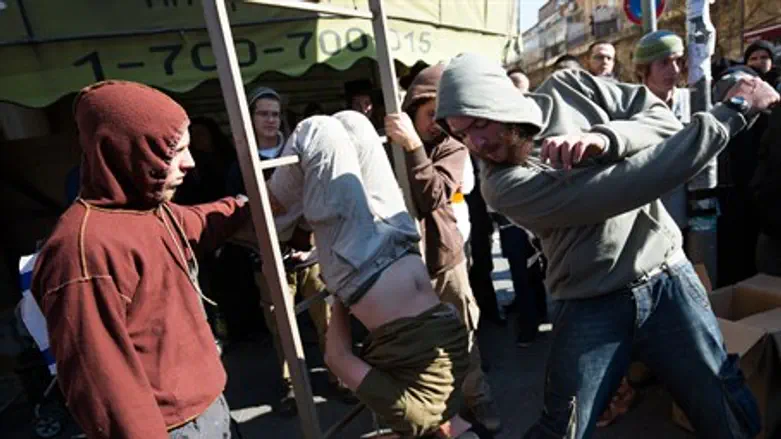
Despite weeks of denials by the Israeli Security Agency (ISA or Shin Bet) and leading politicians, sources close to the lethal Duma arson investigation revealed on Thursday that Attorney General Yehuda Weinstein "personally and concretely" approved torture against the Jewish suspects.
The order to torture the young suspects was given three weeks ago according to the sources, who made the revelation to the leftist paper Haaretz. The report clarifies the statements of Deputy Attorney General Raz Nizri, who told the paper earlier in December that Weinstein had approved "exceptional measures."
According to the sources, Prime Minister Binyamin Netanyahu was not privy to the approval, and only was updated regarding the torture later, after it had already started taking place. Weinstein may well have overstepped his jurisdiction by doing so.
The new revelation comes after ISA repeatedly denied the torture allegations, and a string of politicians got on board by denying the torture and trying to delegitmize the testimony of the suspects regarding it. Those politicians included Netanyahu, Education Minister Naftali Bennett (Jewish Home), Justice Minister Ayelet Shaked (Jewish Home), and Defense Minister Moshe Ya'alon (Likud).
The sources revealed that Weinstein directly gave ISA interrogators permission to torture the Duma suspects, despite such torture being illegal according to civil rights groups.
Weinstein's approval for the torture directly contradicts the mechanism of torture approval determined by Judge Elyakim Rubinstein, after the High Court outlawed torture in 1999. According to Rubinstein, the Attorney General cannot give ISA interrogators permission to use torture in specific incidents, but rather can tell them what techniques he will permit them to do without putting them on trial.
Weinstein on the other hand gave a concrete order to torture the suspects, according to the sources.
A month later, suspects maintain innocence
The attorney general's approval of torture is made all the more remarkable given his long-standing opposition to security forces taking harsh measures against Arab terorrism - just in October he forbid shooting Arab terrorists once they were neutralized, despite cases of terrorists continuing to stab after being shot, and he has likewise opposed changing the guidelines to open-fire on terrorists.
In response to the report, the Justice Ministry headed by Shaked issued a statement, which did not deny that approval was given to torture the suspects.
"The decisions regarding the manner of interrogation were made by the head of the Shabak (ISA) in accordance with its authorities, during supervision and accompaniment by the most senior sources in the Justice Ministry, headed by the Attorney General," read the statement.
One minor suspect in the case reportedly broke down and confessed last week after nearly a month of interrogation, but given the reports of brutal torture in the interrogation, there are heavy concerns that the confession was false and inadmissible as evidence. Prior to the confession, officials admitted there was no evidence against the suspects.
The sources told Haaretz that the rest of the suspects have maintained their silence despite over a month of torture, continuing to argue their innocence.
Just this week two minor suspects were released from interrogation.
One suspect said after undergoing 30 days of interrogation that the ISA is lying, and that the suspects are indeed being tortured - the same suspect was released after the courts threw out the ISA's attempt to keep him in interrogation based on alleged involvement in an unrelated quarrel with Bedouin shepherds two years ago.
Another minor suspect still being held testified before the courts that he tried to commit suicide to end the interrogation and torture, and just this Wednesday, two weeks after the attempt, his lawyers were finally allowed to photograph the numerous scars on his wrist.
A psychiatric counselor had determined the minor suspect was driven into severe depression and traumatic stress as a result of the interrogation, and he was prescribed sleeping pills by a doctor in his detention center due to sleep deprivation related to interrogation and torture.